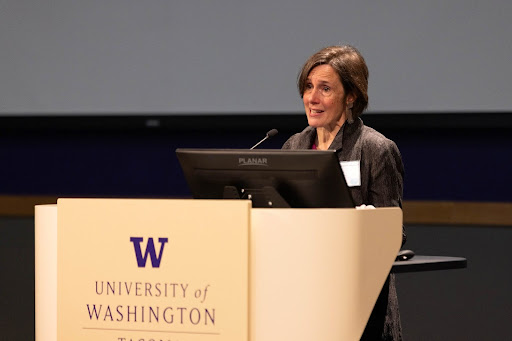University of Puget Sound Hosts 40th Anniversary of National Conference on Peer Tutoring and Writing

By Grace Farrell
On the weekend of Oct. 18–20, the University of Puget Sound hosted the 40th National Conference on Peer Tutoring and Writing (NCPTW). The annual conference aims to respond to the challenges associated with operating college writing centers and further developing peer tutoring programs across the country.
This year, the largest NCPTW event following the COVID-19 pandemic was held in Tacoma. Attendees included 148 peer tutors from 28 states and two countries–the US and Canada. They presented topics connected to the conference’s central theme: “NCPTW: Where are We Now?” Two peer tutors from the Center for Writing and Learning (CWL) presented their ideas along with Julie Christoph, the CWL’s director.
Christoph served as the president of NCPTW and organized the conference hosting after it was moved from Buffalo, New York to Tacoma. She and Puget Sound’s two peer presenters, Josh Cunningham (‘25) and Mercer Stauch (‘26), focused their presentations on the evolving uses of AI in peer tutoring. (Editor’s Note: Mercer Stauch serves as the News Editor for The Trail.)
“It’s a lot of work to host a conference, but it’s an enjoyable task. People are very appreciative if you create good opportunities for them,” Christoph said, who also hosted NCPTW in 2016. While the conference was held at UW Tacoma due to logistical issues, it included “excursions” like a stop at Puget Sound’s CWL. Attendees learned about the CWL’s organization and got to unwind at local stops like Wright Park and Zeek’s Pizza in downtown Tacoma. “I was really focused on having a good program, but also introducing people to Tacoma,” Christoph said.
Christoph and Cunningham both emphasized the importance of NCPTW moving away from being strictly presentation-based; they appreciate the conference’s excursions as ways to build community and break up what would otherwise feel like a much less interactive event.
In addition, the breadth of ideas discussed at the conference was a key takeaway for Cunningham. His discussion of AI in learning centered on how various AI tools can be implemented to assist students during the writing process. He explained that he’s developed an AI framework for application to various educational disciplines — anything from chemistry to philosophy — that introduces subject-specific terminology and concepts required for AI evaluation. Cunningham believes implementing this tool may allow AI to better facilitate interactions between students and writing tutors who are less familiar with writing guidelines specific to a given discipline.
“Every discipline has different values in writing that should be tended to,” Cunningham said. He hopes that, pending updates on the CWL’s AI policy, his framework may get approved for use between writing tutors and their tutees on campus.
Cunningham also emphasized the interdisciplinary perspectives maintained at NCPTW. He acknowledges that many traditional colleges, especially larger universities, assume that writing peer tutors must be English majors. At Puget Sound, English majors don’t exclusively make up the body of writing tutors that the CWL employs. This topic was addressed by other presenters as well. Interdisciplinary tutoring experiences help peer tutors maintain reciprocal relationships with the students they tutor.
“Tutoring is more than just having someone who knows all the answers helping someone who doesn’t have the answers,” says Christoph. She reiterates this reciprocal tutoring relationship as being of central importance to NCPTW’s mission in holding the conference. “It’s a matter of equal exchange and learning how to explore ideas together.”
